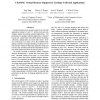Free Online Productivity Tools
i2Speak
i2Symbol
i2OCR
iTex2Img
iWeb2Print
iWeb2Shot
i2Type
iPdf2Split
iPdf2Merge
i2Bopomofo
i2Arabic
i2Style
i2Image
i2PDF
iLatex2Rtf
Sci2ools
107
Voted
OSDI
2006
ACM
2006
ACM
CRAMM: Virtual Memory Support for Garbage-Collected Applications
Existing virtual memory systems usually work well with applications written in C and C++, but they do not provide adequate support for garbage-collected applications. The performance of garbage-collected applications is sensitive to heap size. Larger heaps reduce the frequency of garbage collections, making them run several times faster. However, if the heap is too large to fit in the available RAM, garbage collection can trigger thrashing. Existing Java virtual machines attempt to adapt their application heap sizes to fit in RAM, but suffer performance degradations of up to 94% when subjected to bursts of memory pressure. We present CRAMM (Cooperative Robust Automatic Memory Management), a system that solves these problems. CRAMM consists of two parts: (1) a new virtual memory system that collects detailed reference information for (2) an analytical model tailored to the underlying garbage collection algorithm. The CRAMM virtual memory system tracks recent reference behavior with low...
Related Content
| Added | 03 Dec 2009 |
| Updated | 03 Dec 2009 |
| Type | Conference |
| Year | 2006 |
| Where | OSDI |
| Authors | Ting Yang, Emery D. Berger, Scott F. Kaplan, J. Eliot B. Moss |
Comments (0)

